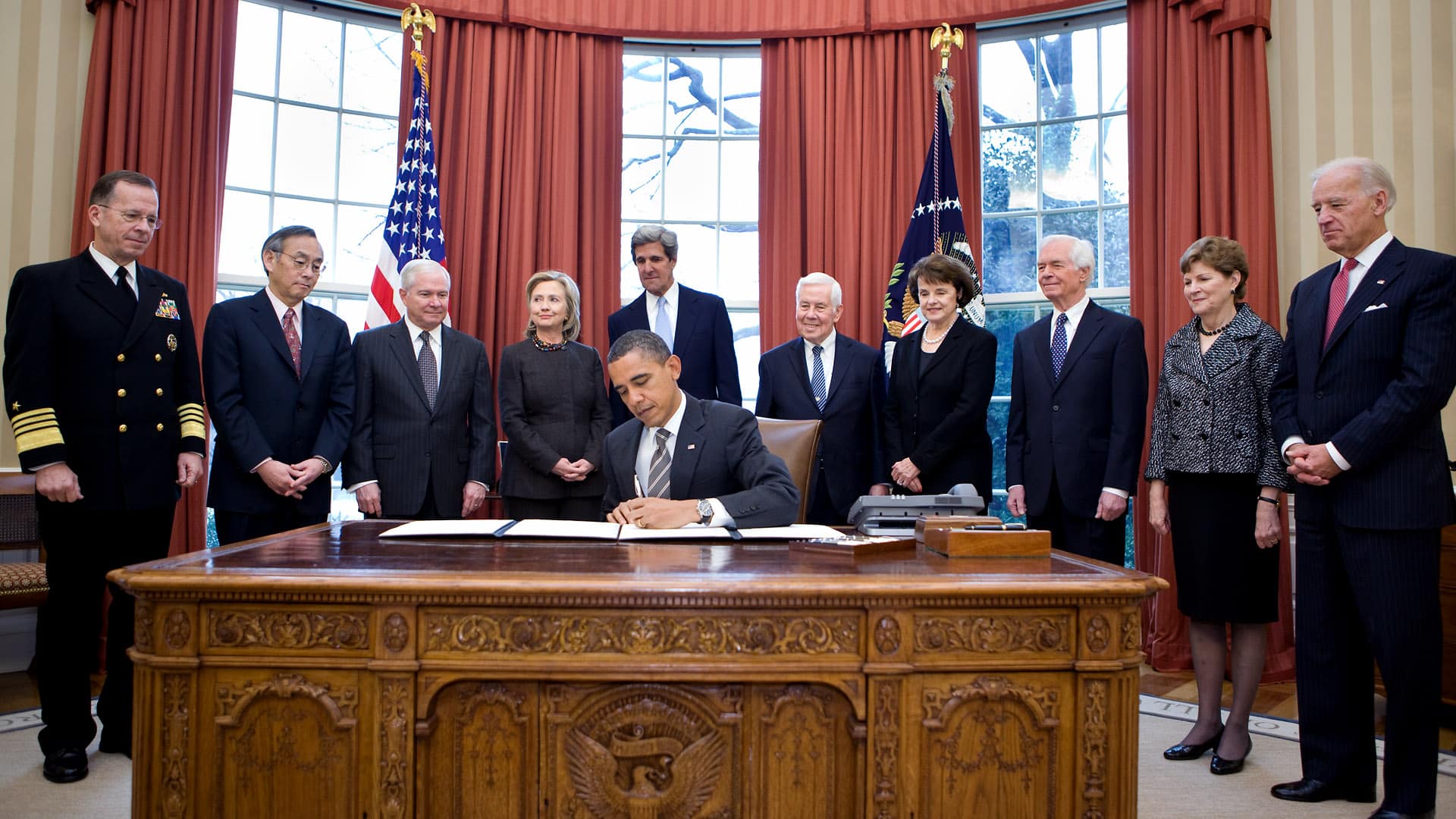Nuclear arms control has had a very rough few years. The latest piece of bad news comes from Russia. Earlier this week, Vladimir Putin announced that Russia is “suspending its membership” in New START, a treaty that limits the number of deployed nuclear warheads and launchers for Russia and the United States. While New START is not completely dead yet, Putin’s announcement is the latest in a series of unfortunate events for the arms control regime.
What is New START?
Arms control negotiations and treaties have helped restrain nuclear competition between the United States and Russia, the world’s two largest nuclear‐armed powers, since the late 1960s. While every agreement is unique, two common themes of U.S.-Russia arms control treaties are mutual limits on the number of nuclear weapons and restrictions or outright bans on specific weapon systems.
Under New START, which entered into force in February 2011, Russia and the United States are limited to 700 deployed launchers (nuclear‐capable bombers, ballistic missile submarines, and intercontinental‐range ballistic missiles) and 1,550 deployed nuclear warheads. It took seven years for the United States and Russia to adjust their nuclear forces to meet these limits, and since 2018 both states have been in compliance.
While warhead and launcher limits are New START’s headline feature, the treaty also contains multiple verification mechanisms such as inspections of nuclear weapon facilities and regular data exchanges. These verification mechanisms ensure treaty compliance and make it generally easier for the United States to gather information on Russia’s nuclear forces and vice versa.
What Does Suspension Mean?
While Putin’s suspension of New START is not a good outcome it is also not the worst outcome.
After Putin’s speech announcing the suspension, Russia’s foreign ministry released a statement clarifying that Russia would not deploy nuclear weapons or launchers above New START’s limits. However, since Russia is suspending its participation in New START’s verification mechanisms, it will be harder for the United States to confirm that Russia is in fact following through on its promise to not exceed the treaty’s limits.
It is also important to note that there have not been any onsite inspections of nuclear weapon facilities since the start of the COVID-19 pandemic, so that specific New START verification measure was dormant for a couple years. However, the United States and Russia kept exchanging data about nuclear forces despite the pandemic.
Russia’s foreign ministry statement left the door open for a return to full compliance with New START, but it said this will only occur if the United States takes steps toward “general de‐escalation,” namely halting support for Ukraine. An unlikely outcome given Biden’s recent visit to Kyiv and promises of continued U.S. military and financial aid.
What Happens Next?
New START is the last remaining U.S.-Russia nuclear arms control treaty. The Trump administration withdrew from the Intermediate‐Range Nuclear Forces (INF) Treaty in 2019 citing Russian violations, and left the multilateral but Russia‐focused Open Skies Treaty the following year. George W. Bush withdrew from the Anti‐Ballistic Missile Treaty in 2002. The United States and Russia are parties to multilateral arms control agreements like the Nonproliferation Treaty and the Partial Test Ban Treaty, but New START is the last bilateral treaty standing.
Russia’s suspension comes at a worrying time for international nuclear stability. China is rapidly increasing the size of its nuclear arsenal, North Korea is moving toward deploying low‐yield nuclear weapons, and Iran is getting very close to obtaining weapons‐grade uranium. Within the United States, there is growing pressure from defense hawks to discard arms control and expand the U.S. nuclear arsenal. New START suspension will fuel this argument.
Arms control treaties have been an important tool for maintaining nuclear stability, especially between the United States and Soviet Union during the Cold War and Russia afterward. Russia’s suspension of New START does not kill the treaty, nor does it mean a massive Russian nuclear buildup will happen soon. But this lack of a short‐term crisis belies a long‐term hollowing out of arms control.
A steady drumbeat of dead U.S.-Russia nuclear treaties coupled with growing arsenals and animosity among great powers is a recipe for fewer controls and less stability. Nuclear competition is back in a way not seen since the Cold War. Arms control treaties could play a role in restricting the worse aspects of that competition, but right now the future of arms control looks bleak.
This article was originally featured at the Cato Institute and is republished with permission.







